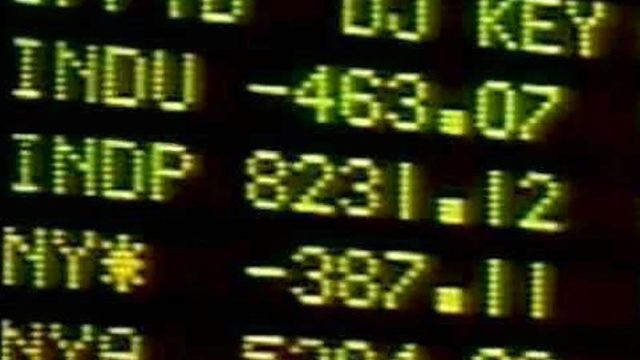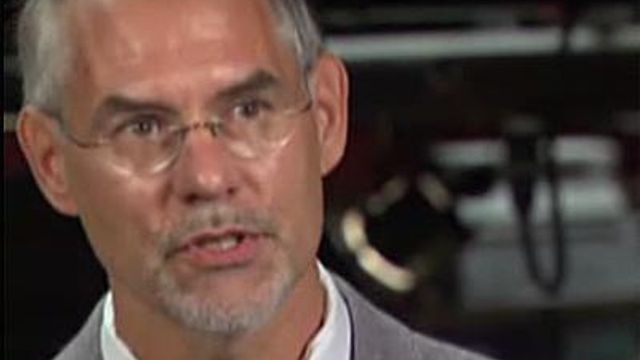Stocks fall on belief global recession is at hand
Wall Street capped another difficult week with steep losses Friday, sending the major indexes to their lowest levels in more than five years as markets around the world skidded lower on the belief that a punishing economic recession is at hand.
Posted — UpdatedIt was a dramatic, fractious day on the Street, with the Dow Jones industrials falling more than 500 points soon after trading began and, following the pattern of recent sessions, recovering ground only to fall sharply again. They ended the day with a loss of 312.
The pullback on Wall Street wasn't as steep as some observers had feared after stocks plunged overseas in response to another round of grim corporate news.
A profit warning Friday from electronics maker Sony sent its shares tumbling in Japan and offered only the latest example that companies are girding for a slowing economy and a pullback among consumers worried about falling home prices and losses on their investments.
In Germany, Daimler's stock fell sharply after the automaker reported lower third-quarter earnings and abandoned its 2008 profit and revenue forecast. That followed news in the U.S. late Thursday from Microsoft Corp., which issued a weaker-than-expected forecast for its fiscal second quarter, pointing to the economy.
"People have been saying that we're in a recession. This is the realization," said Scott Fullman, director of derivatives investment strategy for WJB Capital Group in New York.
"It's becoming evident the problems we've been dealing with in the U.S. are now spreading to the rest of the world, and we're dealing with a worldwide recession," said Mike Walden, an economist at North Carolina State University. "When you get numbers that confirm that, it simply adds to your doubts."
It is clear that many investors are convinced the world economy is headed for a severe downturn even as governments have raced to jump-start credit markets on the hope that a return of more normal lending levels by banks and other financial houses will fan economic activity.
But some say the recent pullbacks have been set off by forced selling, keeping some bargain-seeking traders from entering the market.
"There's nothing new going on," said Scott Bleier, president of market advisory service CreateCapital.com. "This is all about the unwinding of massive leverage."
Bleier attributed the declines to margin calls and investors in hedge funds and mutual funds cashing out. A margin call occurs when investors are forced to sell holdings, like stock, to raise cash at the demands of brokers.
"Market participants' fear is not that the economy is slowing," he said. "The fear is there is an endless supply of things for sale, regardless of price."
Steve Gross, principal at alternative investment and advisory firm Penso Capital Markets, said most large hedge funds have already slashed their positions. Instead, he sees a lack of demand: "There are no buyers at all."
Investors were nervous going into the session after U.S. stock futures – the bets traders place on where the market will go – fell so sharply before Friday's opening bell that selling halts were imposed.
"It's kind of bad when you're down 300 and it almost feels like an up day," said Gerald Townsend, a Raleigh investment adviser. "I have wounds all over me. I'm invested. I eat my own cooking. I'm investing in the same types of things my clients are."
Anxiety levels remain high among area investors, and some said they feel it's too late to get out of the market.
"You see your retirement accounts evaporate. You see your savings evaporate. I'm about half of what I was worth six months ago," investor Joe Luzzi said.
"We asked our financial planner about (selling out), and he told us let it be and eventually it'll come back. So, we put our trust in him," investor Patrick Williams said. "I have threatened him, if we lose it all, something's going to happen."
By the close of trading Friday, according to preliminary calculations, the Dow fell 312.30, or 3.59 percent, to 8,378.95 after falling 504 in the early going. Still, the blue chips remained above the 8,000 level; at its recent low of Oct. 10, the Dow traded as low as 7,882.51.
Broader stock indicators also fell. The S&P 500 index declined 31.34, or 3.45 percent, to 876.77, and the Nasdaq composite index fell 51.88, or 3.23 percent, to 1,552.03.
Friday's finish was the lowest for the Dow since April 25, 2003, when it ended at 8,306.35. For the S&P, it was the lowest ending since April 11, 2003 when the index finished at 868.30.
The Russell 2000 index of smaller companies fell 18.80, or 3.84 percent, to 471.12.
Declining issues outpaced advancers by about 5 to 1 on the New York Stock Exchange, where volume came to 1.58 billion shares.
Friday was the 79th anniversary of the day that, according to many market historians, the October 1929 stock market crash began. Selling began on Thursday, Oct. 24, and accelerated the following week on the days that have since become known as Black Monday and Black Tuesday, Oct 28 and 29.
For the week, the Dow fell 5.35 percent, the S&P 500 lost 6.78 percent and the Nasdaq fell 9.31 percent.
• Credits
Copyright 2024 by WRAL.com and the Associated Press. All rights reserved. This material may not be published, broadcast, rewritten or redistributed.






